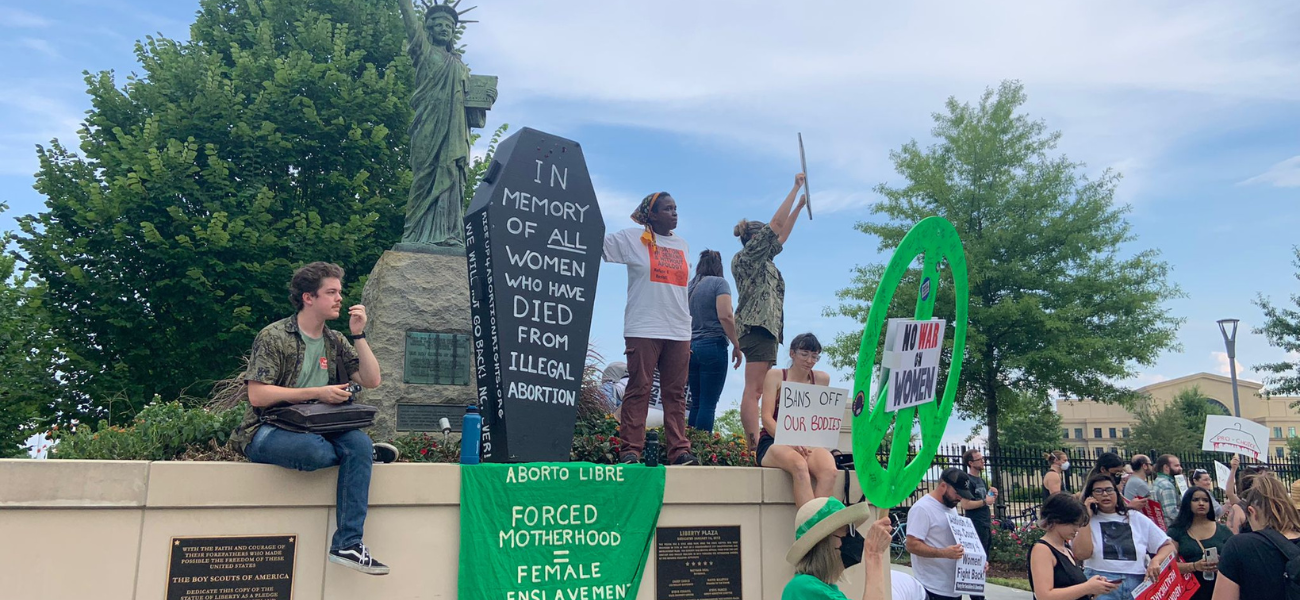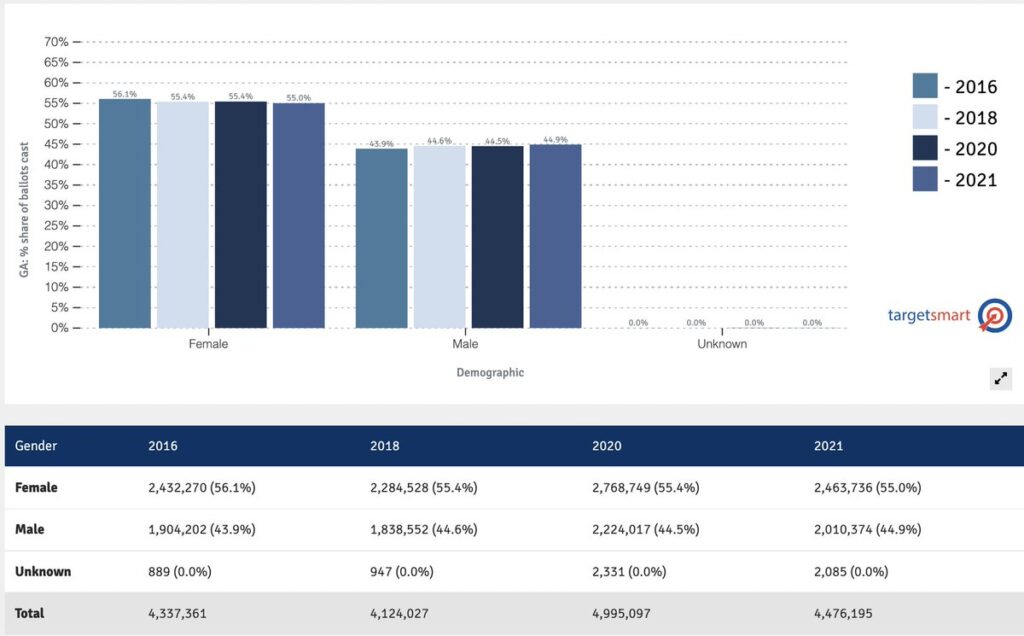Stay ahead of the curve as a political insider with deep policy analysis, daily briefings and policy-shaping tools.
Request a DemoDramatic increase in women registering to vote may be referendum on abortion rights

Abortion Rally at the State Capitol on June 24, 2022. (Credit: Alessandro Marazzi Sassoon for State Affairs)

The Gist
Hell hath no fury like a woman scorned – or whose reproductive rights have been squelched.
Three months after the U.S. Supreme Court ended the nation’s nearly 50-year-old abortion law, women are responding in force — and it’s playing out in a noticeable surge in new voter registration, experts say.
What’s Happening
It appears women in Georgia may be registering their disdain for the U.S. Supreme Court’s decision this summer to overturn the landmark Roe v. Wade decision by registering to vote.
“This has the impact of bringing out a number of women and men to vote who are pro-choice who don’t usually vote,” University of Georgia political science professor Charles Bullock III told State Affairs.
Here in Georgia, some 87,913 people have registered to vote since the June 24 Dobbs ruling, according to data State Affairs obtained from the Secretary of State’s office. More than half — 44,840 — of those new voters are women, data shows, and they appear eager to have their voices heard. The data covers June 24 to September 16. State Affairs was unable to obtain data for the same time period in 2018 by press time.
More than six in 10 of the mail-in or early-voting ballot requests in Georgia are from women, according to an analysis done by TargetSmart for the abortion rights group NARAL Pro-Choice America. That’s higher than requests made in 2018 and 2020, NARAL noted.
“This surge in ballot requests shows high enthusiasm and strong rejection of [Georgia Governor Brian] Kemp’s abortion ban,” NARAL officials said in a press release.
While NARAL’s assessment and the state’s election data aren’t conclusive indicators that the abortion controversy has led to more women registering to vote, one Georgia veteran political observer said the issue could influence the midterm elections – especially in light of recent election outcomes in Kansas and upstate New York.
In the first test of its kind since the Supreme Court decision, Kansans last month overwhelmingly rejected a state constitutional amendment that would have made abortion illegal in the heavily-Republican state. Women accounted for 70 percent of new voters in Kansas following the SCOTUS ruling.
The issue of abortion rights also appeared to help Democrat Pat Ryan win a congressional seat in a special election in late-August in upstate New York. Ryan made the issue a focal point of his campaign while his Republican challenger focused on inflation and the economy.
Here in Georgia, reproductive rights are front and center.
“I can’t say it’s driving people to register to vote,” Nichola Hines, president of the Atlanta-Fulton chapter of the League of Women Voters, said. But Hines, who moderated a well-attended Urban League panel discussion on the issue this week, said “it’s certainly at the top of people’s minds.”
Why It Matters
Maintaining her reproductive rights is a big concern for Yana Batra who will vote for the first time in the November 8 midterm election.
“It’ll definitely be shaping my vote this fall,” said Batra, a freshman at Georgia Tech who registered to vote a few months ago. The Decatur native turns 18 in October.
Georgia State University sophomore Sandra Salazar plans to vote early, motivated largely by Georgia’s abortion ban after six weeks of pregnancy. She said it’s a big issue on her campus. It also will be the 19-year-old’s first time voting.

Salazar said she was shocked by the Supreme Court’s decision. She didn’t think the court would overturn the longstanding law.
“My first thought was ‘Oh, my God, violence against women is going to get so much more aggressive,’ ” Salazar said. “We used to have that comfort knowing that if anything goes wrong — if I get raped or if I have sex with somebody and I don’t want a child right now — I have this [abortion law] cushion. Now that cushion’s been stripped away.”
The cost of an abortion in Georgia ranges anywhere from a few hundred dollars to a few thousand dollars, depending on your insurance, where you live and how advanced you are in your pregnancy, experts say.
That decision becomes even more costly now that Georgia bans abortions after six weeks. Georgians seeking abortions in other states like Florida — where there’s a 15-week ban — can expect to pay several thousand dollars more when you factor in other state abortion fees and travel costs such as childcare, gas, lodging, meals and incidentals.
Women in Georgia already account for a larger share of the state’s electorate than almost any other state, according to veteran Democratic political strategist Tom Bonier, chief executive of TargetSmart, a data and polling firm, and a professor of political science at Howard University.

Before the Supreme Court decision, Bullock noted that most Georgians disapproved of the six-week ban and wanted the unfettered choice to have an abortion.
“If indeed that [SCOTUS Dobbs] decision is encouraging women to register disproportionately and a number of women who might not have voted otherwise are motivated to vote because they want to register their disapproval of the Dobbs decision, then yeah, it’s the kind of thing that could turn the [midterm] election around,” said Bullock, who has written about Georgia and national politics for over 50 years.
Consider Douglas County.
Election officials there have seen a noticeable increase in women voters since the Supreme Court’s decision.
More than four in 10, or 42%, of the 3,623 women who’ve registered to vote this year in Douglas did so in the three months since the Supreme Court decision. Between June 25 and September 22, some 2,894 people registered to vote in Douglas. Nearly 53%, or 1,527,of those were women.
Georgia’s increase in new voters comes as the abortion issue intensifies nationally and in the Peach State.
South Carolina Republican Sen. Lindsey Graham introduced a bill in Congress on September 13 that would ban abortions nationwide after 15 weeks of pregnancy, effectively erasing state-by-state decisions on the issue.
In Georgia, Gov. Kemp, who signed the six-week abortion ban in 2019, is contending with his own controversy after an audio recording recently emerged of him discussing the possibility of banning Plan B contraception if he’s re-elected and the legislature is onboard.
‘Georgia firms at a disadvantage’
The ongoing abortion controversy recently prompted a group of prominent Georgia business executives to pen an open letter to voters about Georgia’s abortion ban’s adverse affect on their businesses.
“As CEOs, we are now forced to grapple with unprecedented decisions about how to help 50% of our workforce, especially when we have locations in multiple states where some of our workforce has rights and some do not,“ the group said. “Georgia’s abortion law now forces us to compete with other states on a whole different level, putting all Georgia firms at a disadvantage. Companies now face the choice of moving to or staying in a state where half of their workforce is facing second-class citizenship and may be subject to investigation or prosecution for routine healthcare.”
The business group is a cross section of chief executives in construction, finance, law, restaurants, technology and other fields.
What’s Next?
With a little over a month until the midterm election, political campaigns are heating up and homing in on women voters.
In a fundraising email, Democratic challenger for Secretary of State Bee Nguyen declared, “I’m the only pro-choice and pro-democracy candidate running for secretary of State in Georgia.”
Greater Georgia, a conservative organization started by former U.S. Senator Kelly Loeffler, is also targeting women.“In contrast to the left’s narrative, not every woman is a liberal – and they aren’t monolithic,” Loeffler told State Affairs in a statement.
“They are proud mothers, professionals, students and community leaders who want to protect freedom and the American Dream, while restoring public safety and economic opportunity,” said Loeffler. “Those values are why the majority of women voting in the May primary voted Republican. With women making up 52% of Georgia’s electorate, we will be the driving force behind the conservative comeback in November.”
Meanwhile, protecting reproductive rights continues to be a big concern, on college campuses, said Batra. “The right to choose to conceive a child and the right to access adequate medical treatment should something go wrong in a pregnancy is very, very present,” especially in environments where women often face heightened risks when it comes to instances of assault, rape and other problems, she said.
“I’ve also heard from my male friends who recognize that this places additional risks on them,” said Batra, who also plans to vote early to avoid any issues on election day. “They might suddenly have to encounter much more fiscal and personal responsibility in their young lives that they’re not prepared for.”
Could the fight over abortion make Georgia a key battleground state in this year’s midterm election? Find out here. Learn more about how states like Indiana are dealing with the abortion issue and women voters here.
Join the Conversation
Want to participate in the discussion? Contact Tammy Joyner at [email protected] or on Twitter @lvjoyner
Header photo: Abortion rally at the State Capitol in Atlanta on June 24, 2022. (Credit: Alessandro Marazzi Sassoon for State Affairs)
Professionals still face licensing delays amid state’s transition to online system
The Gist Georgia’s professionals and business owners are still struggling to obtain professional licenses in a timely manner. As the Secretary of State’s Office rolls out its new Georgia Online Application Licensing System to expedite the process, the efficiency of this new process is being put to the test. What’s Happening Thursday morning at the …
Controversy over AP African American Studies class grows
Rashad Brown has been teaching Advanced Placement African American Studies at Atlanta’s Maynard Jackson High School for three years. He’ll continue to do so — even though the state’s top education official removed it from the list of state-funded course offerings for the upcoming school year. While Brown prepares to start teaching his class on …
Students, teachers, lawmakers blast decision to end AP African American history classes
ATLANTA — A coalition of lawmakers, civil rights leaders, clergy, educators and students Wednesday called on the state’s education czar to rescind his decision to drop an advanced placement African American studies class from the state’s curriculum for the upcoming school year. “This decision is the latest attack in a long-running GOP assault on Georgia’s …
Kamala Harris’ presidential bid reinvigorates Georgia Democrats
Georgia Democrats have gained new momentum heading into the November election, propelled by President Joe Biden’s decision to bow out of his reelection bid and hand the reins to Vice President Kamala Harris. The historic decision, announced Sunday, is expected to prove pivotal in the national and state political arenas and breathe new life and …




